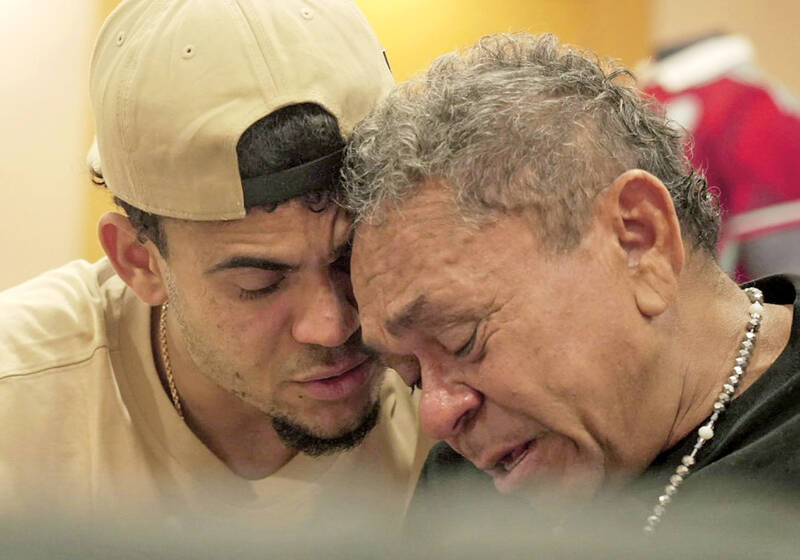A wave of crimes against South American soccer players has underscored the risks faced by athletes loath to return home from overseas clubs to a region where they, or their loved ones, risk being kidnapped, blackmailed or targeted by gangs with a message to send.
In the past few months, the sport has been rattled by threats against the family of Argentine forward Angel Di Maria, the kidnapping in Colombia of Luis Diaz’s father and the blackmailing of Peruvian striker Paolo Guerrero’s mother in a region of the world ravaged by drug trafficking and gang violence.
“These type of violent actions directly threaten the economy and sports success of the clubs,” Argentine club Rosario Central has said of the threats against Di Maria, who opted to remain in Portugal.

Photo: AFP / Federacion Colombiana de Futbol
In March, family members of Di Maria received a note threatening their lives if he returned home to play for any club in Rosario — Argentina’s third largest city that has recently seen an explosion in drug-related crime.
The 36-year-old winger for SL Benfica in Portugal, had earlier said his desire to play once more for his boyhood club, Rosario Central, and win a Copa Libertadores before he retires.
Argentine authorities at the time said the note contained a threat from “criminal organizations” putting on a show of strength.
The soccer player has not spoken about the incident publicly, but an Argentine sports TV channel cited sources close to him as saying he would not return to “prioritize the safety and health of his family.”
Di Maria is reportedly in talks to pursue a career in the US’ Major League Soccer.
Also in Rosario, assailants last year opened fire on a shop belonging to the family of World Cup-winning Argentine captain Lionel Messi’s wife.
They left a threatening message for the soccer player in what was also interpreted as gangs flexing their muscle.
In gang violence-torn Ecuador, 34-year-old forward Enner Valencia recently abandoned plans for a return to home team CS Emelec from Brazil, where he plays for Porto Alegre club Internacional.
“I would love to go to Emelec ... try to help the team that gave me everything, but I would not bring my family to Ecuador,” he told an Argentine journalist last year.
Valencia’s once-peaceful homeland is grappling with a shocking rise in violence and homicides as narco gangs have grown ever stronger and fight bloody turf wars.
In 2022, his sister was taken and held hostage for more than a week near the Colombian border until she was rescued by an anti-kidnapping and anti-extortion unit of the national police.
In October last year, guerrilla fighters kidnapped the father of Liverpool soccer star Diaz.
He was held for 12 days before being freed under pressure from the government negotiating a peace deal with National Liberation Army guerrillas.
The group described the kidnapping as a “mistake.”
Colombia’s top scorer, Radamel Falcao Garcia, subsequently announced he had renounced plans to return to Bogota club Millonarios from Spain.
“You have to see the situation of the country as it is at the moment, a little complex,” he said in an interview after the Diaz incident.
In March, Colombian police said that criminals tried to trick former Colombian international Carlos Bacca into paying a ransom for his sister and brother-in-law.
They led the couple into an area without cellphone reception, then when they were offline and unreachable, called Bacca to demand a ransom for their “release.” Media reports said Bacca paid a relatively modest ransom of US$250.
Extortion, one of the most common crimes perpetrated by criminal groups in Latin America, is ravaging Peru. In February, striker Guerrero, 40, became a target after signing with the club Cesar Vallejo.
Soon, members of the gang “Los Cachacos de Yolin” began extorting his mother, Petronila Gonzales.
They were arrested, and Guerrero stayed on after demanding security guarantees from his new club.
Then there are the threats that regularly befall soccer players in the region.
In at least one case it prompted attacker Willian to leave Brazil.
Soon after returning from Arsenal in 2022 to play for home side Corinthians, Willian opted to go back to England after he and his family received threats from supporters unhappy about his contribution to his new team.

Shohei Ohtani and Clayton Kershaw on Friday joined their Los Angeles Dodgers teammates in sticking their fists out to show off their glittering World Series rings at a ceremony. “There’s just a lot of excitement, probably more than I can ever recall with the Dodger fan base and our players,” manager Dave Roberts said before Los Angeles rallied to beat the Detroit Tigers 8-5 in 10 innings. “What a way to cap off the first two days of celebrations,” Roberts said afterward. “By far the best opening week I’ve ever experienced. I just couldn’t have scripted it any better.” A choir in the

After fleeing Sudan when civil war erupted, Al-Hilal captain Mohamed Abdelrahman and his teammates have defied the odds to reach the CAF Champions League quarter-finals. They are today to face title-holders Al-Ahly of Egypt in Cairo, with the return match in the Mauritanian capital, Nouakchott, on Tuesday next week. Al-Hilal and biggest domestic rivals Al-Merrikh relocated to Mauritania after a power struggle broke out in April 2023 between the Sudanese army and a paramilitary force. The civil war has claimed tens of thousands of lives and displaced more than 12 million people, according to the UN. The Democratic Republic of the Congo-born Al-Hilal

Shohei Ohtani, Teoscar Hernandez and Tommy Edman on Thursday smashed home runs to give the reigning World Series champions the Los Angeles Dodgers a 5-4 victory over Detroit on the MLB’s opening day in the US. The Dodgers, who won two season-opening games in Tokyo last week, raised their championship banner on a day when 28 clubs launched the season in the US. Dodgers manager Dave Roberts shuffled his batting lineup with all four leadoff hitters finally healthy as Ohtani was followed by Mookie Betts, then Hernandez and Freddie Freeman in the cleanup spot, switching places with Hernandez. “There’s a Teoscar tax to

Matvei Michkov did not score on Monday, but the Philadelphia rookie had a hand in both goals as hosts the Flyers earned a 2-1 victory over the Nashville Predators. Ryan Poehling and Jamie Drysdale got the goals for the Flyers (31-36-9, 71 points), who won their third straight. Michkov and Travis Konecny assisted on both. Ivan Fedotov stopped 28 shots to earn his first win since March 1, ending a personal six-game losing streak. Zachary L’Heureux got the lone goal for Nashville. Michael McCarron and Brady Skjei got the assists for the Predators (27-39-8, 62 points), who have just four goals in their